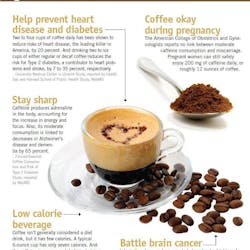Coffee is one of the most popular refreshments in the vending and OCS industry. It also appears to offer better health for regular drinkers, at least in moderation.
Myths and old research about coffee leaves consumers with concerns about how it's affecting their bodies. It's thought to raise blood pressure, cause dehydration, increase the risks for heart disease, and cause cancer. Some of these negative health consequences come from an unusually high intake of coffee or caffeine. But for the past several years research has consistently credited moderate coffee intake with reducing the risk of heart disease, brain cancer, Alzheimer's disease and other conditions. Most researchers pointed out their findings are based on observations and questionnaires, which makes it difficult to pinpoint if it's the coffee itself, or something about coffee drinkers, that's leading to the results. However, most agree drinking a cup O' Joe in the morning isn't having negative effects on health. Following is a sample of the latest published research on the health benefits of coffee. When recounting any health facts, it's important operators give the source. With that in mind there is an easy 1-page take away sheet at the end of this article, for operators to place in break rooms for customers.
Dispelling Coffee Myths
A New York Times article in 2008 reported on many coffee myths, among them being its link to dehydration. According to the Center For Science In The Public Interests' Nutrition Action Healthletter, while the caffeine in coffee can be a diuretic (making a person have to go the bathroom more than they normally would), a review of 17 studies shows drinking less than 550 mg a day (the amount in roughly 3 cups of coffee) produces no more urine than drinking non-caffeinated beverages. Only in studies of above 575 mg does caffeine become a diuretic.
The same Healthletter disputes the myth of coffee causing high blood pressure and heart disease. According to a study following more than 150,000 women for 10 years, caffeine can spike blood pressure for awhile, but when coffee is ingested in typical doses there's no link to prolonged high blood pressure. There's little evidence that daily coffee increases the risk of heart disease or abnormal heart rhythms as well. In fact, reviews done in 2010 report moderate coffee reduces these risks.
Coffee Helps The Heart
Cardiovascular disease affects more than 80 million people, according to the American Heart Association's 2010 update. It's a big issue, and while drinking coffee won't fix the problem, a Dutch research team from the University Medical Center in Utrecht suggests it just might lower the risks. Health Day News reported the study, which followed more than 37,00 Netherland residents, and found those who had two to four cups of coffee daily had a 20 percent lower risk of heart disease compared to people who drank less than two, or more than four. Tea's performance was even stronger (six cups daily reduces the risk by 36 percent).
Lowers Diabetes
Diabetes and Dementia are less likely among coffee drinkers, according to WebMD. It reported on a 2005 Harvard School of Public Health study review, which showed a 35 percent decrease in type 2 diabetes for people who drank six to seven cups of coffee a day, and a 28 percent decrease for those drinking only four to six cups. More recent Australian research found the risk of type 2 diabetes dropped 7 percent for every additional cup of coffee ingested daily.
Researchers believe these lower risks might be due to the natural antioxidants in coffee. Antioxidants stop damage from free radicals, a natural by-product of the body using oxygen. Antioxidants are found in other foods, such as chocolate, as well, and are being used to promote health benefits.
The study results could also be due to coffee's natural mineral content, which helps the body use insulin (a major factor in diabetes). Since the studies are observational, there is no way to determine exactly what is lowering people's risks for developing these conditions.
Coffee is also linked to reduce stroke risk. In a 2009 study of nurses, those who reported drinking two or more cups a day showed a 20 percent decrease in risk of stroke, regardless of high blood pressure, high cholesterol levels, or having type 2 diabetes.
Vastly Reduces Mental Illness Risk
Demetia and Alzheimers are other diseases coffee seems to have an effect on, reports the same WebMD article. A 20 year study, from Finland and Sweden, showed men and women who drank three to five cups daily were 65 percent less likely to develop the diseases compared to nondrinkers and occasional drinkers.
Caffeine Ok During Pregnancy
One of the most well known pregnancy "don'ts" was drinking caffeine. Pregnant women were told to drink decaf, or risk losing their babies. However, the American College of Obstetricians and Gynecologists rescinded that recommendation in July of 2010. The ACOG announced there is no link between moderate caffeine consumption and miscarriage. Moderate caffeine consumption is defined as 200 mg of coffee. The group says it remains unclear whether drinking more caffeine has any adverse effects or not.
Host Of New Research
Studies appear weekly confirming coffee's positive place in the diet, such as Nestle's research on instant coffee. Research indicates three cups of instant coffee increases the Bifidobacterium Spp. bacteria in the human digestive system. This bacteria has reputed health benefits similar to probiotics, although no health claims are yet being made.
A 2007 study, in the Cochrane Database of Systematic Reviews, reported in the New York Times, concluded coffee could ease asthma symptoms for a short time. The chemical structure of caffeine is similar to an asthma medication, which prompted the research.
While 30 years ago a study linked coffee to pancreatic cancer sending a scare through coffee drinkers everywhere, it's now been refuted. The latest research indicates coffee keeps people from getting certain cancers. In a study led by Dominique S Michaud about coffee and tea intake, the risk of brain tumors was lowered for those who drank more than 100 ml (approximately half a cup of coffee) of caffeine a day. The risk dropped 34 percent for the brain cancer glioma, a specific type of brain cancer affecting the central nervous system.
The American Association for Cancer Research released a press release that coffee protects from head and neck cancers. An International Head and Neck Cancer Epidemiology consortium study showed people who drank four or more cups a day had a 39 percent decreased risk of oral cavity and pharynx cancers combined, over nondrinkers.
It seems that all the health benefits linked to coffee are seen in people who drink it in moderation, somewhere between 2 to 6 cups daily. It should come as a relief that enjoying some of America's favorite morning refreshment isn't harming people's health. Instead, research shows it is doing some good in helping them live a healthier lifestyle.





